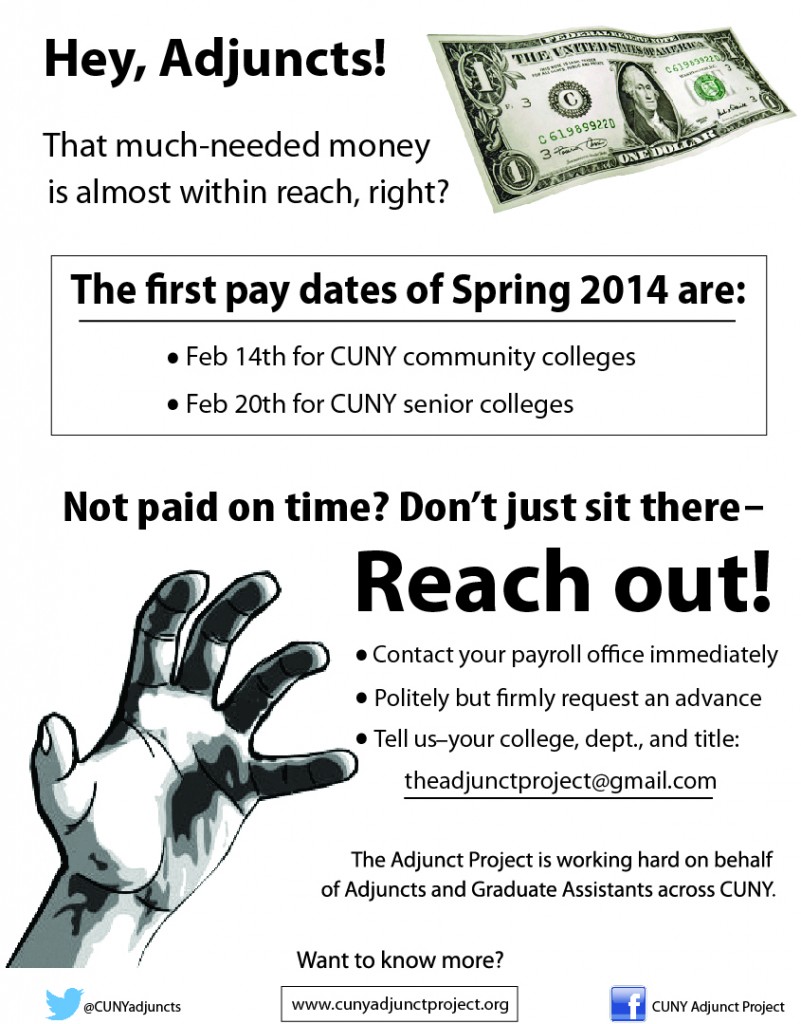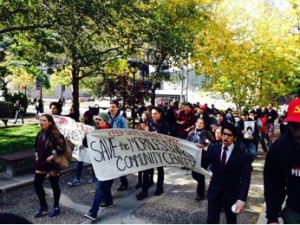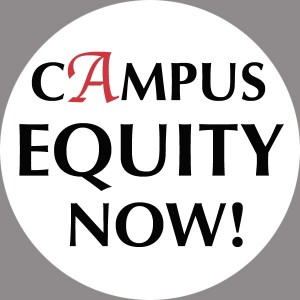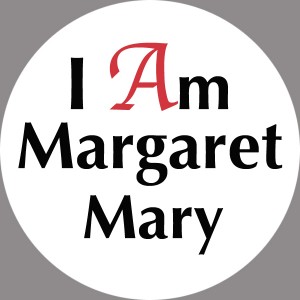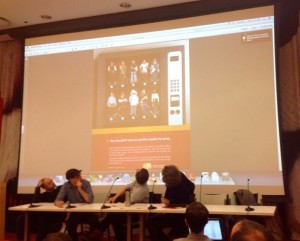 Following are the remarks I prepared for the closing plenary of the MLA Subconference last Thursday, on which I appeared, on behalf of the CUNY Adjunct Project, with Chris Newfield of the University of California–Santa Barbara, Kyle Shafer of Unite Here!, and Jimmy Casas Klausen of the University of Wisconsin–Madison. Though I veered from these particular words—I’d quickly handwritten them, in my near illegible script—the views are the same as I expressed in person, as you’ll see on the archived livestream (which you should check for the other panelists’ remarks and subsequent discussion).
Following are the remarks I prepared for the closing plenary of the MLA Subconference last Thursday, on which I appeared, on behalf of the CUNY Adjunct Project, with Chris Newfield of the University of California–Santa Barbara, Kyle Shafer of Unite Here!, and Jimmy Casas Klausen of the University of Wisconsin–Madison. Though I veered from these particular words—I’d quickly handwritten them, in my near illegible script—the views are the same as I expressed in person, as you’ll see on the archived livestream (which you should check for the other panelists’ remarks and subsequent discussion).
The photo above, by Lee Skallerup Bessette, shows an image, presented by Shafer, of hospitality workers in a vending machine—a specific depiction of how capitalism renders people in general: disposable. If we are to resist precarity, we must resist capitalism and its various deployments, as I try to show. —Sean M. Kennedy
First of all, and again, I want to thank the organizers of this very generative convening. Thank you all for inviting the CUNY Adjunct Project to appear, and thank you for your generously donated labor. And, frankly, it shouldn’t be our job, as graduate students, to change the university. We have enough other things to do—research, write, teach, attend conferences on money we don’t have—the list goes on—that we don’t have time, let alone resources, to solve all the problems facing higher education too. But since the people with available time and resources—tenured faculty and faculty unions, administrators, disciplinary organizations and other academic bodies—apparently have no interest, nor ability, to fix these issues, doing so must be our work as well. And so I thank everyone here in this newly formed collective, and I look forward to continuing this mobilization, in particular in coordinating actions across our various campuses between now and next year’s gathering in Vancouver.
I also want to note my regret that Marc Bousquet can’t be with us tonight as expected. Not only is he an alumnus of my very program at the CUNY Graduate Center, but his longstanding analyses of academic capitalism, particularly in How the University Works, have provided an important foundation for my own views on the political economy of U.S. higher education. Indeed, I love to quote his remark that the PhD holder is now the “waste product of graduate education,” especially at department-wide meetings in which most attendees, professors and students alike, look at me like I’m crazy. But Marc is dead on about the expendability of laborers, who are eliminated, both symbolically and materially, under global capitalism. What is a prison, after all, except the housing of waste—of incapacitated workers deliberately left behind by the structural adjustment that has battered specific U.S. communities since Reagan? What is imperial war, of which the U.S. is the reigning arbiter, except the incapacitating of communities around the world?
Prison and war frame my remarks tonight not just because of their central relationships to U.S. governmentality and capital accumulation but also due to my institutional and geographic locations at the City University of New York, whose students are subjected to the whims of campus security when they’re not being terrorized by the NYPD through its racist, violent stop-and-frisk program. Although the police target black and brown men, the costs of stop-and-frisk—and prisons at large—to individuals and neighborhoods are countless. And when youth of color make it to CUNY—that is, if they’re not pushed out earlier by the school-to-prison pipeline or the brutal testing regime (both of which line the pockets of corporate executives and investors)—they are now offered a dubious stability in the form of military service, as CUNY has welcomed back ROTC after a 41-year absence—a military that has historically preyed upon the multiracial working class. Meanwhile, U.S. imperialism, safeguarded by the military, and the sturdy hegemony of the American dream continue to make New York City a hub for numerous diasporic communities. Indeed, the diversity of oppressed nationalities in the city led the American Enterprise Institute to recommend CUNY as a recruiting ground.
I was asked to speak tonight on one aspect of precarity, and how to resist it, and as this sketch of issues at CUNY indicates, I want to highlight the critical necessity of intersectional analysis and organizing. In other words, there can be no single-issue activism or research. At CUNY, the myriad intersecting issues—and I only briefly outlined a few—make it impossible to address change without also addressing the full complex of problems that jointly maintain the status quo. And this is the case across higher education, given the university’s deep entanglement with processes and histories of colonialism, racialized social control, and oppression.
In practice, what this means for me, as an organizer for the CUNY Adjunct Project, is that I must also organize with and alongside organizers for racial and economic justice broadly, since academic labor, like labor at large, is shaped by structural forces that delimit not just equal opportunity but equal resources as well. It means I must collaborate with and stand beside organizers working to end stop-and-frisk, since that affects the students I teach as contingent faculty and the colleagues I work with inside and outside of class. It means I must work in concert with organizers demanding an end to the militarization of CUNY and its appointment of war-criminal David Petraeus, overseer of death squads and torture in Iraq and drones at the CIA. It means showing up at hearings and rallies for comrades disciplined by City College and turned over to the law on allegations of “almost” inciting a riot for protesting the seizure of the Morales/Shakur Community and Student Center, an autonomous space won by black and Puerto Rican people—students and residents of Harlem working together—in their—our—still-ongoing struggle to decolonize CUNY. It means demanding a parental-leave policy for Graduate Center student workers—currently none exists—so that they don’t have to forfeit their teaching fellowships if they want to care for their newborn children. Again, the list goes on.
I am one of four phenotypically white, cisgender men on this panel tonight, an observation I make not to criticize but to think through critically. Indeed, this room is primarily white, and as such reproduces the prevailing whiteness of the academy, and marks how much work needs to be done to rectify the racial injustices of higher education. But we—and I mean those of us who are white, with all our racial privilege—need to be part of that work. Similar to how we want tenured faculty to use their privilege, and resources, to help us contingent faculty end the two-tier system of academic labor and concomitant exploitation—one of the many themes of this conference—those of us with the capital granted to us by white privilege must spend it—all of it—for the sake of racial justice. That is to say, we must work against our privilege, to undo it, akin to how my mentors at the Revolutionary Students Coordinating Committee, or RSCC—the rhyme with SNCC is deliberate—urge “class suicide” of the bourgeoisie, petit and grande. Only when whiteness is eliminated, and the capital it has accumulated by dispossession is returned, will there be an end to precarity.
In other words, we must fully reckon with the settler colonialism and chattel slavery on which the U.S. was founded and which destroyed communities—of people, of thought, of practice—all over the world. These paired legacies are alive at CUNY, as they are everywhere. As such, I believe we must reclaim the notion of contingency so that it names radical possibility as much as it does material vulnerability. The contingency I imagine would allow us to choose the labor we want to do, be with the people with whom we want to be, govern ourselves in the ways we want to be governed, travel to where we want to travel, and take care of one another in the manner in which we want to be taken care of. Legacies of such collective determination are also alive, even if they’re often demoted to “cultural differences” by the dominant communities of the global metropole.
At the same time, we must also remember that the institutions that discipline us are precarious, as yesterday’s presentation on private-bond-funded, tuition-backed campus construction showed. But when a protest can increase interest rates—and attendant debt-service payments that can run into the millions—it gives universities even more reason to crack down on dissent, as we have seen happen this last semester at CUNY, which is now codifying such repression.
Again, we must contend with militarization, and the capitalism it protects—and the communities harmed by both. To counter this violence, in the present and historically, we need to organize across divides and resist the colonial logic of separation. Only then will we be resisting precarity too.
(Cross-posted to Sean’s website.)

